Yaku
Yaku 「役」 are specific hand patterns or conditions that score points, analogous to poker hands. Each yaku is worth a specific amount of han, and multiple yaku can be combined into one hand. It is not expected of new players to know every yaku, but learning the most common yaku is important. Most importantly, every hand must include at least one yaku in order to count as a winning hand.
Han
Each yaku is assigned a han value. Whenever a player wins, their hand's yaku are summed up, and the hand scores points based on the total amount of han. If a hand has multiple possible interpretations, the highest possible hand is scored.
Open vs closed
A hand is considered open if it makes a tile call from another player's discard. These include chii, pon, and open kan. Otherwise, it is closed.
Some yaku can only be scored closed; they are invalidated when the hand opens. Other yaku reduce in value if part of an open hand. The rest of the yaku score the same regardless if a hand is open or closed.
Nomi
Nomi 「ノミ」 refers to a hand that contains only one yaku and no dora. For example, riichi nomi 「リーチノミ」 means "riichi only". The term is mostly used for low value yaku, like tanyao and pinfu. It is acceptable to use it for higher value yaku, like chinitsu, but this is rarely done. The term is not used for yakuman, due to their value.
Yaku types
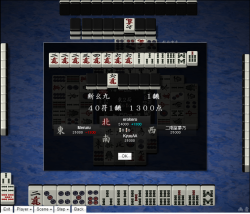
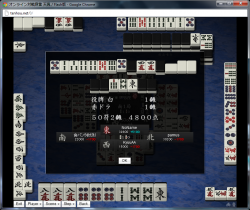
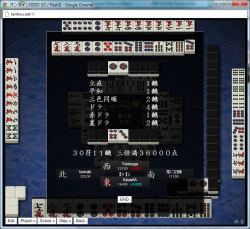
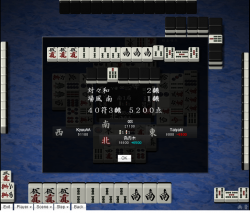
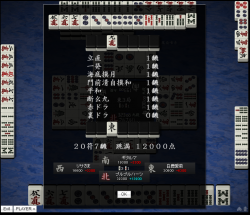
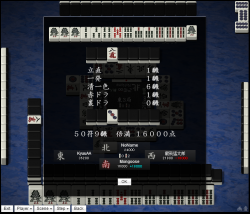
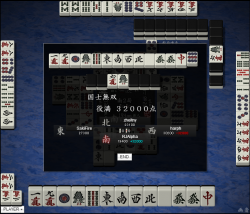
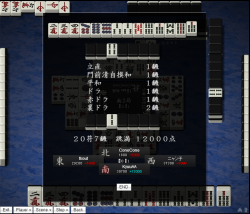
Yaku are scored based on hand composition and how the hand was won. Most yaku focus on what tiles the hand had; a few are based on where the winning tile was obtained.
Riichi
A player can choose to declare riichi with any closed hand that is tenpai (one tile away from winning).
- Any closed hand in tenpai may choose to declare riichi, scoring this yaku.
- A riichi on your first turn is a double riichi, which is worth more points.
- After declaring riichi, if you win by your next tile draw, you score this yaku. (Invalidated if anyone makes a tile call.)
Win location based
These yaku are dependent on how you win the hand. These yaku can allow otherwise "yakuless" hands to win.
Discard based
- Winning with a tile used for an added kan by another player.
- Winning off of the last possible discarded tile for the hand.
Draw based
- Winning with the last tile draw.
- Drawing the winning tile with a closed hand.
- Drawing a winning tile after a kan call.
Honor based
These yaku depend on the use of honor tile groups. These may be mixed with number tiles.
- All tiles are the same suit or honor tiles.
- All tiles are honor or terminal tiles.
- Two dragon triplets, and a pair of the third dragon.
- No honors or terminals are used.
- A triplet of: your seat wind, the round wind, or any dragon.
Sequential
These yaku require sequential tile groups.
- Two identical sequences (two sequences with same suit and numbers).
- A complete string of 1-9 tiles, arranged into sequences of: 123, 456, and 789.
- Every tile group must be a sequence (among other conditions).
- "Two iipeikou"; two sets of identical sequences.
- Three identically numbered sequences, one of each suit.
Terminal based
These yaku revolve around terminal, or complete lack thereof.
- Every tile group, including the pair, has an honor or terminal.
- Every tile is an honor or terminal.
- Every tile group, including the pair, has a terminal.
- No terminals or honors are used.
Triplet based
These yaku require at least one triplet in order to be valid. Quads count as triplets for these yaku, but triplets don't count as quads.
- Three closed triplets.
- Three quads.
- Three identically numbered triplets across the three suits.
- Two dragon triplets, and a pair of the third dragon.
- Every tile group is a triplet.
- A triplet of: your seat wind, the round wind, or any dragon.
Suit based
- All tiles are the same suit or honor tiles.
- All tiles are the same suit.
Yakuman
Yakuman is a special class of yaku. Yakuman are worth the maximum amount of points, and cannot be combined with non-yakuman yaku. They are among the most difficult to complete, so players may treat them as special.
Combining yaku
Yaku may be combined with other yaku. When a hand qualifies for two or more yaku, their han value is added up. Combining yaku and/or dora is important for scoring big hands.
Optional yaku
Optional yaku, or local yaku, are yaku not included in the standard ruleset of riichi mahjong. These yaku may be added with house rules, increasing the game's complexity and number of available hands.
See Also
External links
- Yaku in Japanese Wikipedia
- Wikipedia listing
- Yaku frequency among Tenhou.net players (Japanese)
- Lists all the yaku occurrences in Tenhou.net by percentages and by room
- Pointing out which yaku to learn first
| |||||||||||||||||||||||||||||||
| |||||||||||||||||||||||||

